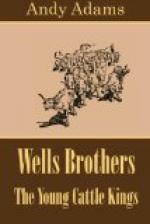On the other hand, Forrest lightened all depression of spirits. “Don’t worry,” said he to the boys. “Just as sure as water runs and grass grows, I’ll come over this trail again. So far in life, I’ve never done any good for myself, and I’m going to play this hand out and see if you lads land on your feet. Now, don’t get the idea that I’ve done any great feat in rustling you boys a few cows. It’s one of the laws of life, that often we can do for others what we can’t do for ourselves. That sounds like preaching, but it isn’t. Actually, I’m ashamed of myself, that I didn’t get you double the number of cattle. What we did skirmish together was merely the flotsam of the trail, the crumbs that fall from the supper table, and all obligations to me are overpaid. If I could have had just a few tears on tap, with that hospital talk, and you boys being poor and orphans—shucks! I must be getting doty—that plea was good for a thousand strays and cripples!”
The brothers took courage. So far their chief asset was a fine range. Nearly three hundred and fifty cattle, imperfect as the titles to many of them were, had been secured and were occupying the valley. A round dozen cow ponies, worthless for the present, but which in time would round into form, were added to the new ranch. Every passing commissary had laughed at the chance to discard its plunder and useless staples, and only the departure of the man behind the venture, standing in the shadow as it were, threw a depression over the outlook.
Funds, with which to pay his reckoning, had been left with Forrest. The boys had forgotten the original agreement, and it was only with tact and diplomacy that a snug sum, against his protest and embarrassment, was forced on Joel. “It don’t come off me,” said the departing man, “and it may come handy with you. There’s a long winter ahead, and the fight ain’t near won yet. The first year in starting a ranch is always the hardest. But if you boys can only hold these cattle until grass comes again, it’s the making of you. You know the boy is father to the man, and if you are true-blue seed corn—well, I’ll bet on two ears to the stock.”
Forrest’s enthusiasm tempered the parting. The start for the railroad was made at daybreak, and in taking leave, each boy held a hand, shaking it heartily from time to time, as if to ratify the general advice. “I’ll make Dodge in two days,” said the departing guest, “and then I’ll know the meaning of this wire. It means something—that’s sure. In the mean time, sit square in your saddles, ride your range, and let the idea run riot that you are cowmen. Plan, scheme, and devise for the future. That’s all until you hear from me or see my sign in the sky. Adios, senors.”
CHAPTER VI
SUNSHINE AND SHADOW
An entire week passed, during which the boys were alone. A few herds were still coming over the trail, but for lack of an advocate to plead, all hope of securing more cattle must be foregone. Forrest had only taken his saddle, abandoning for the present all fixtures contributed for his comfort on arriving at the homestead, including the horses of his employers. The lads were therefore left an abundance of mounts, all cattle were drifted above the ranch, and plans for the future considered.




